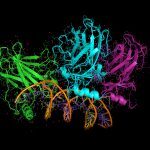Link to Pubmed [PMID] – 26522402
Link to DOI – 10.1016/j.jaci.2015.09.015S0091-6749(15)01353-6
J Allergy Clin Immunol 2016 Feb; 137(2): 545-58
Regulatory dendritic cell (DC) markers, such as C1Q, are upregulated in PBMCs of patients with grass pollen allergy exhibiting clinical benefit during allergen immunotherapy (AIT).We sought to define markers differentially expressed in human monocyte-derived DCs differentiated toward a proallergic (DCs driving the differentiation of TH2 cells [DC2s]) phenotype and investigate whether changes in such markers in the blood correlate with AIT efficacy.Transcriptomes and proteomes of monocyte-derived DCs polarized toward DCs driving the differentiation of TH1 cells (DC1s), DC2s, or DCs driving the differentiation of regulatory T cells (DCreg cells) profiles were compared by using genome-wide cDNA microarrays and label-free quantitative proteomics, respectively. Markers differentially regulated in DC2s and DCreg cells were assessed by means of quantitative PCR in PBMCs from 80 patients with grass pollen allergy before and after 2 or 4 months of sublingual AIT in parallel with rhinoconjunctivitis symptom scores.We identified 20 and 26 new genes/proteins overexpressed in DC2s and DCreg cells, respectively. At an individual patient level, DC2-associated markers, such as CD141, GATA3, OX40 ligand, and receptor-interacting serine/threonine-protein kinase 4 (RIPK4), were downregulated after a 4-month sublingual AIT course concomitantly with an upregulation of DCreg cell-associated markers, including complement C1q subcomponent subunit A (C1QA), FcγRIIIA, ferritin light chain (FTL), and solute carrier organic anion transporter family member 2B1 (SLCO2B1), in the blood of clinical responders as opposed to nonresponders. Changes in such markers were better correlated with clinical benefit than alterations of allergen-specific CD4(+) T-cell or IgG responses.A combination of 5 markers predominantly expressed by blood DCs (ie, C1Q and CD141) or shared with lymphoid cells (ie, FcγRIIIA, GATA3, and RIPK4) reflecting changes in the balance of regulatory/proallergic responses in peripheral blood can be used as early as after 2 months to monitor the early onset of AIT efficacy.



